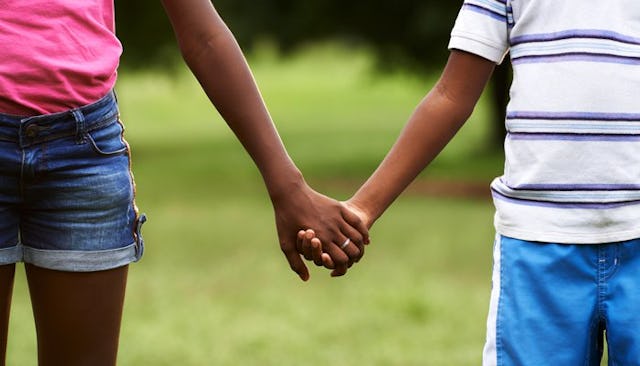9 Things I Wish People Would Stop Saying About My Black Children

Since we adopted our children, all of whom are black, we’ve been confronted by white people seeking to prove to us how open-minded, racially-aware, and fair they are when it comes to race relations. This is done in a myriad of ways, none of which go over very well. Usually the speaker ends up coming across as the opposite of what they intended: racially-illiterate, closed-minded, and ignorant.
Here are some of the common things we hear and why they make us cringe:
1. Using “ghetto,” “thug,” or “those people” when referring to a black person. Stereotyping is never a good idea, and “those people” you are referring to are MY people, my children.
2. “Your daughter is so, so, so, so pretty! She’s just so pretty! Oh my gosh! She is so beautiful!” Ok, this just gets weird. One compliment is fine. No need to put it on repeat. Your gushing embarrasses my child and makes me really uncomfortable. And it makes you look like your trying to cover up something, like your discomfort or your true perceptions of black people.
3. “I’m teaching my kids to be colorblind.” Colorblindness does not exist. Dismissing race rather than acknowledging it and celebrating it, as well as not making your children aware of the racial inequalities that exist, does your children and mine a great disservice.
4. “My black friend….” Usually the person being black has nothing to do with the story you are telling. You don’t need to convince me of your willingness to befriend a person of color, nor should you treat that person as your token black friend by boasting of their race in casual conversations.
5. Telling us not to make situations “about race” or to not “play the race card.” Listen, there is no card. This isn’t a game. People of color know when a situation involves inequality, discrimination, and injustice. Instead of arguing with someone about their experience, try listening and learning.
6. “I just love little mixed babies. They are SO cute.” Children aren’t accessories to be toted around and admired by strangers. Children are humans with feelings, thoughts, and rights. Treating them like trophies to be displayed rather than humans is degrading. Additionally, complimenting bi-racial children but neglecting to offer similar compliments to Black, Hispanic, or Asian children just rubs me the wrong way.
7. Whispering “black” when describing a person while telling a story. Black isn’t a bad word. There is no need to lower your voice and lean in when saying it. But keep in mind, unless the person’s race has anything to do with your story, there’s no reason to throw it in and offer it up in a hushed tone.
8. Trying to convince us that we should be more concerned with “Black-on-Black crime” than the frightening realities black boys are facing in our country regarding stereotyping, police brutality, and inequality. Empathy is the appropriate response to a person expressing his or her concerns with the violence against Black boys. At the root of any situation where a child loses his or her life, is a parent who has had to bury a child. No lecture on your personal thoughts on crime, no statistics, and no defense of all-things-White-guilt is going to eradicate the realties that Black boys and their families face.
9. “Why is there a Black History Month and not a White History Month? That seems racist.” I’m not sure I have the energy to answer this question yet again, but I guess I will. Black History Month is important because it offers our country (including our schools) the opportunity to focus on prominent, trail-blazing, history-making black people. Black history is American history. Many textbooks and curriculums frequently leave out much of Black history beyond a few individuals and a small chapter on slavery and Civil Rights. Black History Month encourages all to focus on the incredible accomplishments of Black Americans. Celebrating a specific race is not racism.
As a white person, I understand that many who share my skin-tone lack the right words and understanding to converse with others about issues surrounding race and race-relations. As a general rule, instead of injecting personal opinion, try listening, asking questions, and offering empathy.
And above all else, remember, people of every race yearn to gain respect, validation, and connection.
Related post: How To Mess Up Your Kids’ Understanding of Race
This article was originally published on